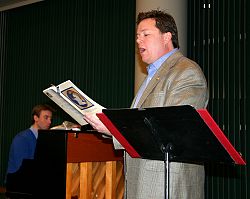Liturgy changes are reviewed in the Mass of Renewal

SALT LAKE CITY — The new music for the Mass of Renewal was showcased at the Southwest Liturgical Conference at the Calvin L. Rampton Salt Palace Convention Center Feb. 2. William Gokelman and David Kauffman wrote the music for the Mass of Renewal to coincide with the changes that will take place in the Third Roman Missal on the first Sunday of Advent, Nov. 27. "Our hope was to write a musical setting of the Mass that wouldn’t get in the way of the prayer experience," said Kauffman. "What we hope is that the music we have written for the Mass of Renewal helps the prayer experience. The words obviously were given to us, so it is our hope that at the end of the liturgy the music helps people to pray." The National Association of Pastoral Musicians announced on July 16, 2010 that the Mass of Renewal by Gokelman and Kauffman of San Antonio, Texas, was the winner of its new Mass setting competition. The national convention was held in Detroit, Mich. The Mass of Renewal is one of more than 70 new compositions written in anticipation of the third edition of the Roman Missal. At the conference, clergy, religious education directors, choir directors, and people wanting to get acquainted with the new music had the opportunity to sing the Kyrie, Gloria, Sanctus and the Great Amen from the Mass of Renewal, which seeks to capture more accurately the original scripture. Father Ben Bacino from Saint Mary Help of Christian in Pueblo, Colo., likes going back to the original texts and translating them in a way that is truer to the original text. "For example, when we say ‘The Lord be with you,’ the answer will be ‘And with your spirit,’ he said. "That’s truer to the Latin that I grew up with – the same spirit that called me to the priesthood." Father Donald P. Malin from Saint Peters Parish in Pueblo, Colo., is a former musician who believes Kauffman and Gokelman have done a good job putting the music together with the new words. "The music will help facilitate the learning; music is going to help the people learn the new words easier than just recitation." Kauffman said when people sing they pray thrice because music gives wings to the word. "When you put a word in a note it can creep into the heart in a way a word alone cannot," he said. "So if you put the right music on a word then hopefully by grace it will creep into the crevices of the heart and soften it and make it open to the spirit of God." Monsignor Anthony F. Sherman, executive director of the Bishop’s Committee for Divine Worship with the United States Conference of Catholic Bishops, thought Kauffman and Gokelman did a fantastic job with the Mass of Renewal. "I think people have embraced the new translations, even though they may not like it totally," he said. "They have been open to it and understanding about it and really have taken the medium of music to help enable our people to adjust to these texts. I’m very hope filled. The closing hymn is right on target. The words, some of which were chosen by Pope John Paul II, have to point out the fact that what we pray has to be what we live. One of the real pluses as we begin to implement the new translations is going to come from the musicians and their ability to move us along by the melodies." "I think this Mass setting will be very accessible to congregations and musicians," said Brett Patterson, music director for Holy Family Parish in Ogden, who accompanied Kauffman on the piano during the workshop. "I think the workshop was a good idea to introduce the people to the music that’s coming out. The music is upbeat and has nice movement to it." "The music was beautiful and I think it will be easy for people to assimilate," said Lois Cooper from Saint Pius X Parish in Moab. Music director Nanci Flesher, also from St. Pius X, is enthused about the new changes. "It is such an incredible opportunity for catechesis on a very intimate level in small groups of people in our parishes," said Flesher, who is a retired music teacher. Gokelman, a military brat who lived in many places in the United States and abroad, began his musical journey at age 10 on a military friend’s piano. He earned a Bachelor of Music degree in piano performance from Incarnate Word College, where he won the Amy Freeman Lee Award for the Arts and Humanities., and also holds a Master of Music degree in vocal coaching and accompanying from Westminster Choir College in Princeton, where he was awarded the Alfred E. Merron Award for Accompanying. Kauffman grew up a devout Catholic in St. Louis, Mo., and was always drawn to liturgical music. He spent more than two decades on what he calls a faith journey that has grown from a personal pursuit to a full-blown mission to create music that touches hearts, feeds souls and influences lives.
© Copyright 2024 The Diocese of Salt Lake City. All rights reserved.

Stay Connected With Us